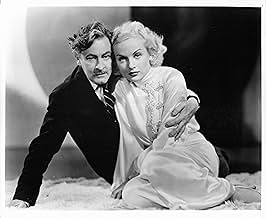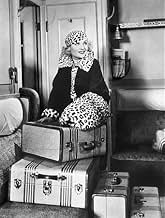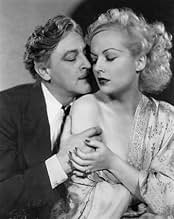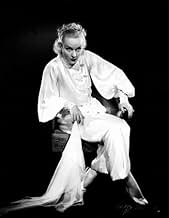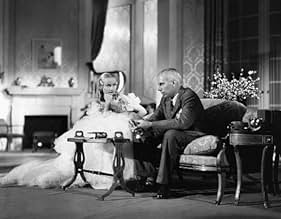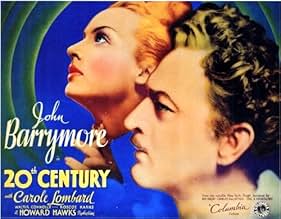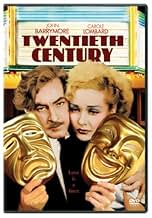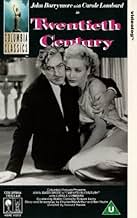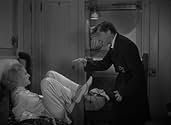VALUTAZIONE IMDb
7,2/10
7622
LA TUA VALUTAZIONE
Aggiungi una trama nella tua linguaA flamboyant Broadway impresario who has fallen on hard times tries to get his former lover, now a Hollywood diva, to return and resurrect his failing career.A flamboyant Broadway impresario who has fallen on hard times tries to get his former lover, now a Hollywood diva, to return and resurrect his failing career.A flamboyant Broadway impresario who has fallen on hard times tries to get his former lover, now a Hollywood diva, to return and resurrect his failing career.
- Regia
- Sceneggiatura
- Star
- Premi
- 4 vittorie e 1 candidatura in totale
Charles Lane
- Max Jacobs
- (as Charles Levison)
Bobby Barber
- Sign Painter
- (non citato nei titoli originali)
Herman Bing
- Beard #1
- (non citato nei titoli originali)
Lynton Brent
- Train Secretary
- (non citato nei titoli originali)
Anita Brown
- Black Stage Showgirl
- (non citato nei titoli originali)
James Burke
- Sheriff
- (non citato nei titoli originali)
James P. Burtis
- Train Conductor
- (non citato nei titoli originali)
Eddy Chandler
- Cameraman
- (non citato nei titoli originali)
Nick Copeland
- Treasurer
- (non citato nei titoli originali)
Recensioni in evidenza
Why this loud talky mess gets top ratings from professionals stumps me (TMC, Maltin, et al.). The only thing I can figure is they're overly impressed by pedigree—namely Hawks, Lombard, Barrymore, and the writing team of Hecht and MacArthur. But once you get past the legendary reputations, the results are more annoying than impressive. It seems someone confused frenetic with amusing, while the arm waving babble is simply non-stop. It's like everyone will laugh if you just say it loud enough with enough spastic energy.
Barrymore, in particular acts like he's heck-bent on climbing the walls. But the lines aren't funny, and neither are the situations—reputations or no. Maybe the screenplay is aimed at show-biz types who will catch on to esoteric inside jokes. Some such is the only explanation I can think of. Hawks, fortunately, appears to have learned his lesson. His Binging Up Baby (1938) amounts to a masterpiece of madcap. It's everything this indulgent mess isn't, but should be. There appears to be a moral to this movie, but whatever it is, it's not a good one.
Barrymore, in particular acts like he's heck-bent on climbing the walls. But the lines aren't funny, and neither are the situations—reputations or no. Maybe the screenplay is aimed at show-biz types who will catch on to esoteric inside jokes. Some such is the only explanation I can think of. Hawks, fortunately, appears to have learned his lesson. His Binging Up Baby (1938) amounts to a masterpiece of madcap. It's everything this indulgent mess isn't, but should be. There appears to be a moral to this movie, but whatever it is, it's not a good one.
John Barrymore leads a great cast in this zany comedy of life in the theater. His performance alone is worth seeing as he proves what a gift he had for comedy. The rest of the cast is wonderful too. And if you disagree, I'll close the iron door on ya!
Funny and intelligent comedy features a brilliant performance by Barrymore, spoofing his earlier "Svengali" role. He looks and acts a lot like Peter Sellars would in later similar performances; now morose, then practically jumping with energy. Lombard also turns in a right-on performance.
Here is a film where Hawks really finds his mark, because the comedic action is perfectly timed, flows nicely, and feels natural, and even includes some early Hawks "overlapping dialogue".
Hardly a dull moment, miles above its peers.
Here is a film where Hawks really finds his mark, because the comedic action is perfectly timed, flows nicely, and feels natural, and even includes some early Hawks "overlapping dialogue".
Hardly a dull moment, miles above its peers.
John Barrymore is in rare form in Twentieth Century (1934), Howard Hawks's hilarious, fast-paced screwball comedy. He plays flamboyant Broadway director-producer Oscar Jaffe, a man for whom the whole world is truly a stage. The always enchanting Carole Lombard co-stars as Mildred Plotka/Lily Garland. (Oscar demanded the name change because Mildred Plotka isn't nearly as glamorous sounding as Lily Garland.) Mildred, an aspiring Broadway actress, is remade by Oscar into a star of the New York stage. For three years he directs her plays, guides her career, and is her lover. But after they have a big disagreement, she takes off for Hollywood. Her career soars; his plummets. Time passes and then on board the Twentieth Century heading for Grand Central Station, they meet again. As usual in a Hawks film, the supporting cast is outstanding; and Ben Hecht and Charles MacArthur's screenplay is one of their finest.
Completely over the top, silly but very funny, Twentieth Century makes the most of Carole Lombard and John Barrymore's comedic talents. This film marked the beginning of Lombard's fabulous career (tragically cut short in 1942) and the end of Barrymore's. They truly are two of the best performers that motion picture history has ever seen. I really envy Lombard's ability to laugh on cue, and Barrymore's ability to pull hilarious facial expressions.
Oscar Jaffe, (John Barrymore), a big time director, made Mildred Plotka now named Lily Garland a star, but HIS career is taking a battering after Lily packed up her life with him and on stage for Hollywood stardom. They accidentally meet on the Twentieth Century Limited and hilarity ensues! There is some fantastic physical comedy here and both Barrymore and Lombard are fantastic as the overly dramatic actor/director couple who are only real "from curtain to curtain". It's a great balance of drama/comedy.
My favourite part was definitely the start. I laughed out loud when Barrymore says "Dinga-linga-ling". After seeing him in Dinner at Eight (1933), I was surprised he had THIS much talent for comedy. Carole of course is her usual perfect self. I believe neither overshadows each other. I was very impressed with both of them. However, I have not forgotten the brilliant supporting cast, with the likes of Walter Connolly, Roscoe Karns and Ralph Forbes.
Twentieth Century is a classic screwball comedy which could please the harshest of critics. Dramatic, funny but in many ways climatic. I would have enjoyed it even it had been disappointing as all the fashions were absolutely divine! Wonderful to see Hollywood's greatest actors produce such fine work together. A classic through and through.
Oscar Jaffe, (John Barrymore), a big time director, made Mildred Plotka now named Lily Garland a star, but HIS career is taking a battering after Lily packed up her life with him and on stage for Hollywood stardom. They accidentally meet on the Twentieth Century Limited and hilarity ensues! There is some fantastic physical comedy here and both Barrymore and Lombard are fantastic as the overly dramatic actor/director couple who are only real "from curtain to curtain". It's a great balance of drama/comedy.
My favourite part was definitely the start. I laughed out loud when Barrymore says "Dinga-linga-ling". After seeing him in Dinner at Eight (1933), I was surprised he had THIS much talent for comedy. Carole of course is her usual perfect self. I believe neither overshadows each other. I was very impressed with both of them. However, I have not forgotten the brilliant supporting cast, with the likes of Walter Connolly, Roscoe Karns and Ralph Forbes.
Twentieth Century is a classic screwball comedy which could please the harshest of critics. Dramatic, funny but in many ways climatic. I would have enjoyed it even it had been disappointing as all the fashions were absolutely divine! Wonderful to see Hollywood's greatest actors produce such fine work together. A classic through and through.
Lo sapevi?
- QuizJohn Barrymore once said that the role of Oscar was "a role that comes once in a lifetime" and even deemed this his favorite of all the movies he appeared in.
- Blooper(at around 20 mins) O'Malley arrives at Lily's apartment. When she answers the door, he discards his newspaper twice between shots.
- Citazioni
Oscar Jaffe: Go on, Owen... tell her I'm dying... and DON'T OVERACT!
- Versioni alternativeThere is an Italian edition of this film on DVD, distributed by DNA Srl. The film has been re-edited with the contribution of film historian Riccardo Cusin. This version is also available for streaming on some platforms.
- ConnessioniFeatured in The Men Who Made the Movies: Howard Hawks (1973)
- Colonne sonoreHappy Days Are Here Again
(1929) (uncredited)
Music by Milton Ager
Lyrics by Jack Yellen
Sung a cappella by Walter Connolly
I più visti
Accedi per valutare e creare un elenco di titoli salvati per ottenere consigli personalizzati
- How long is Twentieth Century?Powered by Alexa
Dettagli
Botteghino
- Lordo in tutto il mondo
- 10.078 USD
- Tempo di esecuzione
- 1h 31min(91 min)
- Colore
- Proporzioni
- 1.37 : 1
Contribuisci a questa pagina
Suggerisci una modifica o aggiungi i contenuti mancanti


